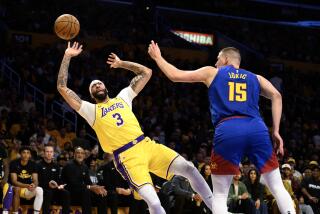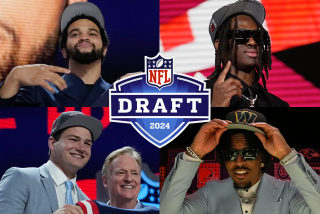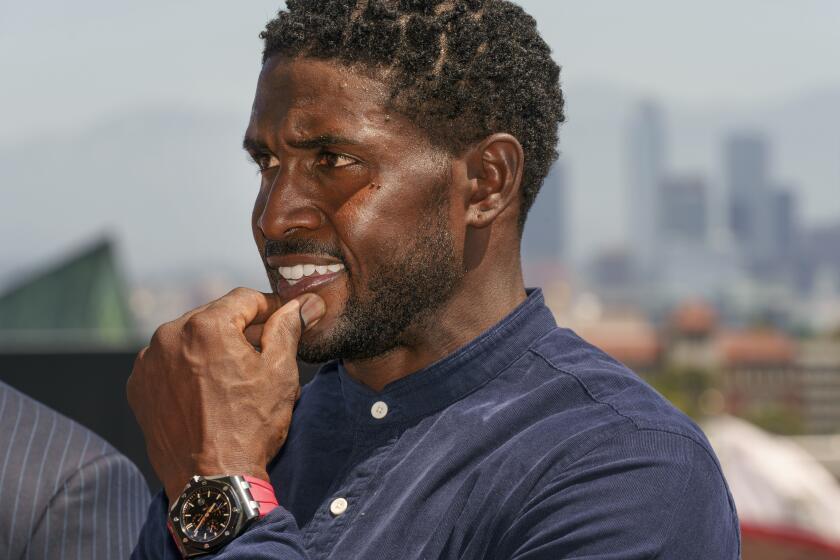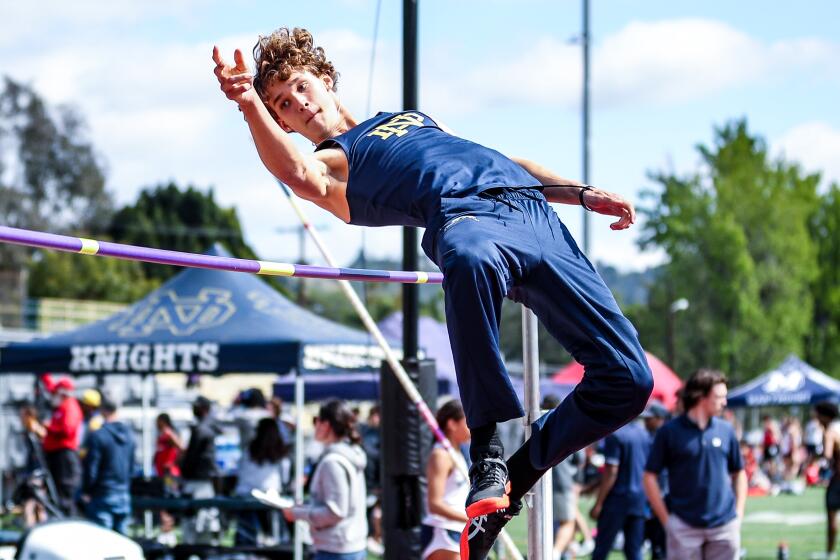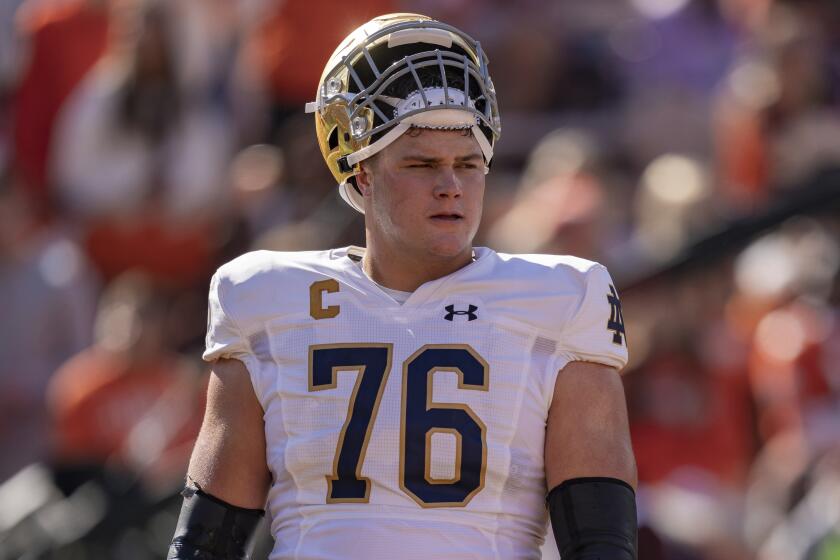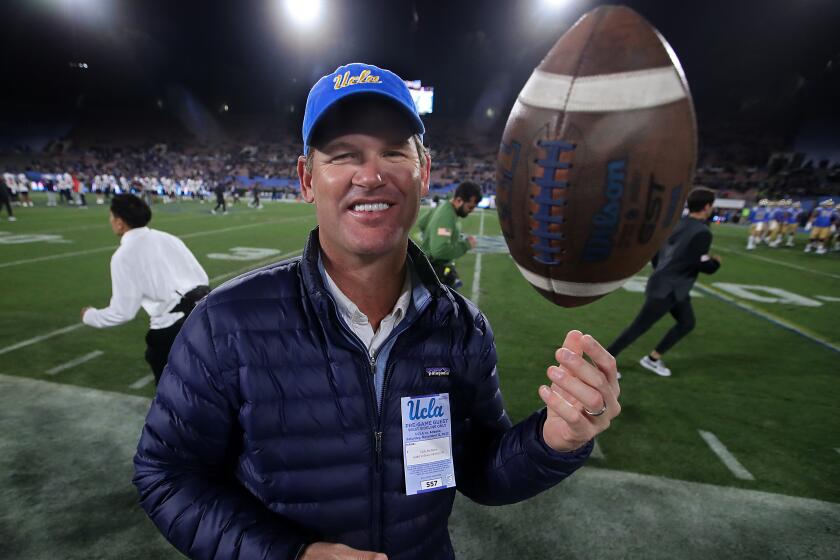Hey, coach: Remember, winning isn’t everything
Don’t let the cute uniforms fool you -- youth sports can be fraught with as much pressure, stress and win-at-all-costs mentality as the pro leagues. Eventually, some kids just give up.
Training the coaches might make a difference.
Adults who are taught to emphasize learning from mistakes, doing one’s best and having fun can greatly reduce stress in young athletes, two recently published studies found. They’re also more likely to motivate kids toward bigger goals.
“If we view sports as something that’s really important in the development of children, then we want to create a climate in which children are going to enjoy sports and develop healthy attitudes and values about sports -- creating an environment in which people don’t have high levels of fear,” says Ronald Smith, psychology professor and director of the clinical psychology program at the University of Washington in Seattle.
He co-wrote the studies, which appeared in the March issue of the Journal of Clinical Sport Psychology and the February issue of the Journal of Sport & Exercise Psychology. Both followed two groups of male and female basketball players (216 total), ages 10 to 14 with similar demographics, plus 37 coaches, all from parks and recreation programs in the Seattle area.
About half of the players were coached by men and women who had gone through a 75-minute workshop on teaching athletes how to learn from mistakes, how to define success as doing the best one can and how to enjoy the game. Those adults had also been taught how to provide individual attention and how to encourage players to set personal goals for improvement.
The other players -- the control group -- were led by coaches who did not attend the workshop and who coached in their usual manner. All athletes had two hour-long practices, plus one game per week for 12 weeks.
At the beginning and end of the season, both groups of players filled out questionnaires measuring their sports-related achievement goals, anxiety and feelings about themselves. They were asked if they felt more successful when they were better than other athletes or when they gave their best effort; if they persisted in the face of difficulty; if they felt queasy when they competed; and if they worried about not performing well.
At the conclusion of the study, those in the control group showed an increase in anxiety levels, while the study group’s anxiety levels dramatically decreased. Achievement goals changed for the study group; they were more oriented, for example, toward feeling successful when playing better. The control group scored higher on questions that related to ego, such as feeling more successful when the team wins.
Although Smith has studied anxiety and self-esteem as it relates to sports, this is the first time he has examined achievement goals. “Using this incredible vehicle for personal development of children can cut both ways,” Smith said. “It can result in very positive psychological consequences -- and can unfortunately have negative consequences for kids.”
Using elite young competitors as an example, he added: “These gifted athletes get to be 13, 14, 15, and they’re burned out and they withdraw from the activity. That’s really a shame.”
Jim Thompson, founder and executive director of the Palo Alto-based Positive Coaching Alliance, which conducts coaching workshops for youth sports programs, says that the average youth coach is unlikely to get any training whatsoever. If he or she does, he says, it usually focuses on skills.
“Very few coaches get preparation in what might generally be called sport psychology -- the art of coaching.”
Many youth coaches are parents with little or no experience, Thompson says. “They feel a lot of pressure to win because of ego. They’re not prepared to take advantage of what we call the endless procession of teachable moments that sports provides.”
Missing a free throw, for example, doesn’t have to be a disaster: “Making it OK for them to miss,” he adds, “makes it more likely for them to make it.”
Overly involved parents are also something a coach “should be prepared to deal with, and promoting this mastery type of approach would alleviate some of that,” says Dave Czesniuk, director of operations for the Center for Study of Sport in Society at Northeastern University in Boston, a research, education and advocacy program. “When you hear about coaches subbing in better players against league rules in order to get a victory, clearly they’ve missed the point of developing athletes and serving as role models.”
Smith says the training program (to learn more, go to www.wardepub.com) is being used with children and coaches in inner-city Chicago neighborhoods as part of an after-school initiative by the William T. Grant Foundation, which partly funded the research.
“The positive side of this,” he says, “is that it can be fixed when people have the information they need.” As for the kids who leave sports, “when they drift out,” says Smith, “there’s concern about what they’ll drift into.”
*
More to Read
Get our high school sports newsletter
Prep Rally is devoted to the SoCal high school sports experience, bringing you scores, stories and a behind-the-scenes look at what makes prep sports so popular.
You may occasionally receive promotional content from the Los Angeles Times.
